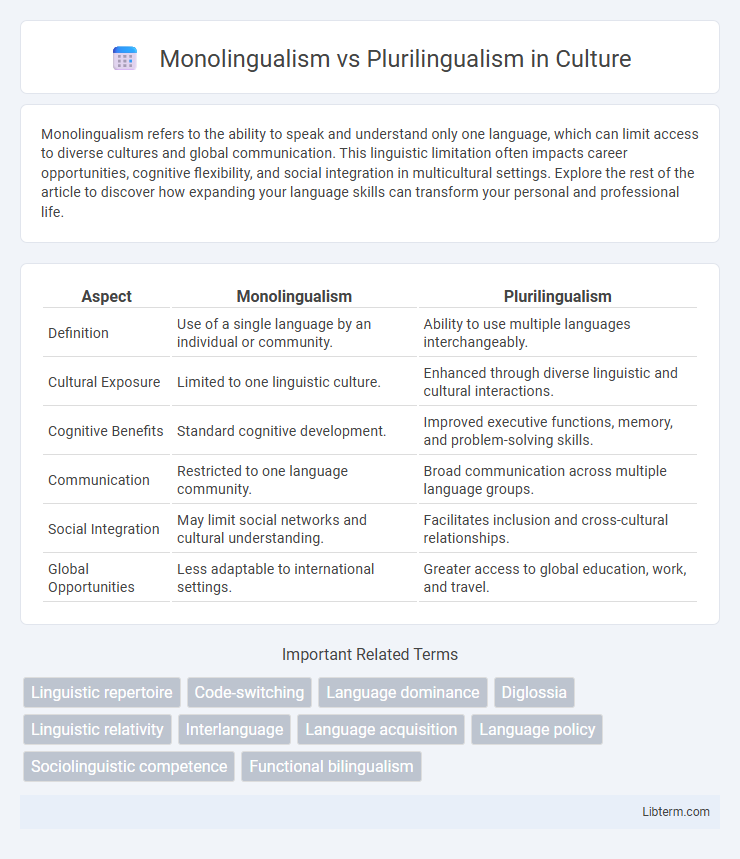Monolingualism refers to the ability to speak and understand only one language, which can limit access to diverse cultures and global communication. This linguistic limitation often impacts career opportunities, cognitive flexibility, and social integration in multicultural settings. Explore the rest of the article to discover how expanding your language skills can transform your personal and professional life.
Table of Comparison
| Aspect | Monolingualism | Plurilingualism |
|---|---|---|
| Definition | Use of a single language by an individual or community. | Ability to use multiple languages interchangeably. |
| Cultural Exposure | Limited to one linguistic culture. | Enhanced through diverse linguistic and cultural interactions. |
| Cognitive Benefits | Standard cognitive development. | Improved executive functions, memory, and problem-solving skills. |
| Communication | Restricted to one language community. | Broad communication across multiple language groups. |
| Social Integration | May limit social networks and cultural understanding. | Facilitates inclusion and cross-cultural relationships. |
| Global Opportunities | Less adaptable to international settings. | Greater access to global education, work, and travel. |
Understanding Monolingualism and Plurilingualism
Monolingualism refers to the ability to speak and understand only one language, often limiting cognitive flexibility and cross-cultural communication skills. Plurilingualism, however, involves the integrated use of multiple languages within an individual's linguistic repertoire, enhancing cognitive adaptability and intercultural competence. Understanding these concepts is crucial for developing effective language education policies that promote global communication and cultural awareness.
Historical Perspectives on Language Proficiency
Historical perspectives on language proficiency reveal monolingualism was traditionally valued for promoting national identity and cultural unity, especially during the rise of nation-states in the 19th century. In contrast, plurilingualism gained recognition for its cognitive, economic, and diplomatic advantages during periods of globalization and colonial expansion. Studies in historical linguistics show that plurilingual competence often emerged naturally in trade hubs and multicultural empires, reflecting the pragmatic need for communication across diverse linguistic communities.
Cognitive Effects of Monolingualism and Plurilingualism
Monolingualism limits cognitive flexibility by restricting exposure to diverse linguistic structures, resulting in narrower problem-solving approaches and reduced mental adaptability. Plurilingualism enhances executive functions such as task switching, attention control, and working memory through continuous practice in managing multiple languages. Neurocognitive research shows that plurilingual individuals exhibit increased gray matter density in brain regions associated with language processing and cognitive control compared to monolinguals.
Social and Cultural Impacts of Language Diversity
Monolingualism often limits social interaction and cultural exchange, reducing opportunities for empathy and global understanding. Plurilingualism enhances cognitive flexibility and fosters inclusive communities by promoting communication across diverse cultural contexts. Language diversity strengthens social cohesion by celebrating multiple identities and facilitating cross-cultural dialogue.
Education Systems: Monolingual vs Plurilingual Approaches
Monolingual education systems prioritize instruction in a single language, often limiting students' exposure to diverse linguistic and cultural perspectives, which can affect cognitive flexibility and global competence. Plurilingual education approaches integrate multiple languages within the curriculum, promoting not only language proficiency but also intercultural communication skills, critical thinking, and adaptability in multicultural environments. Research shows that plurilingual programs enhance student engagement and creativity while better preparing learners for globalized labor markets and international collaboration.
Economic Advantages of Plurilingual Skills
Plurilingual skills enhance economic competitiveness by enabling individuals to access broader job markets and engage in international trade more effectively. Employers highly value multilingual employees for their ability to communicate across diverse cultures, fostering better client relations and expanding business opportunities. Countries with a higher proportion of plurilingual citizens often experience increased foreign investment and stronger global economic ties.
Language Policy and Globalization
Monolingualism often limits language policy effectiveness in globalized contexts by prioritizing a single national language, potentially restricting international communication and economic competitiveness. Plurilingualism supports language policies that embrace multiple languages, enhancing cross-cultural communication and facilitating global collaboration in education, trade, and diplomacy. Governments adopting plurilingual policies tend to better integrate diverse populations and leverage globalization's multilingual demands for innovation and social cohesion.
Psychological Benefits of Language Diversity
Plurilingualism enhances cognitive flexibility, improving problem-solving skills and memory retention by engaging multiple language systems. Monolingual individuals typically experience fewer neural adaptations associated with language switching, potentially limiting cognitive resilience. Studies show that plurilingualism contributes to delayed onset of dementia and increased emotional intelligence through diverse linguistic and cultural exposure.
Challenges in Promoting Plurilingualism
Promoting plurilingualism faces significant challenges such as limited resources for teaching multiple languages and insufficient teacher training in multilingual methodologies. Educational systems often prioritize monolingual proficiency, creating institutional barriers to incorporating diverse languages in curricula. Social attitudes and policies may also hinder plurilingual development by valuing dominant languages over minority or indigenous ones.
Future Trends in Language Acquisition
Future trends in language acquisition emphasize plurilingualism as global connectivity and intercultural communication increase. Emerging technologies like AI-driven language learning platforms support personalized, immersive, and adaptive multilingual education. Linguistic research predicts a shift toward dynamic language competence, where individuals integrate multiple languages fluidly rather than mastering a single language exclusively.
Monolingualism Infographic

 libterm.com
libterm.com